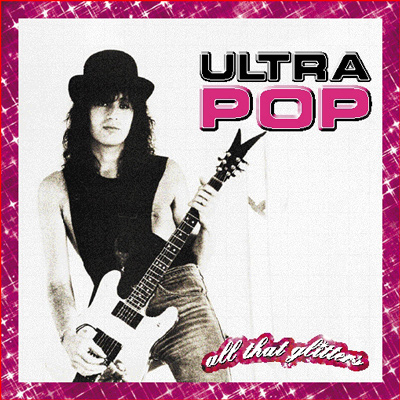
Sister, London, Spiders & Snakes guitarist
Lizzie Grey
FIBM: What's new, what have you been up to lately and what's in the future?
Lizzie: Spiders & Snakes did a commercial shoot over the summer for
the California Dept. of Conservation's recycling program. It's getting played on regional Fox television
right now and the response at our website http://www.spidersandsnakes has been phenomenal! The song we
perform is called "You Threw Your Bottle in the Trash," and needless to say, it's a satire along the lines
of Spinal Tap. The band we portray is in a creative slump, unable to come up with a title for a new guitar
riff, when their roadie comes to the rescue asking, "Who threw their bottle in the trash?" It's more than
a little ironic comedy and needless to say, fits us perfectly. Also, we've got a big Halloween show
coming up at the Cat Club in West Hollywood, so we're busy promoting that along with our latest
album "Hollywood Ghosts" on Sansei Records distributed through Super D. The reviews of "Hollywood Ghosts" worldwide
have been beyond our wildest expectations. As for the immediate future, we're looking forward to getting the band
to the UK and Japan as part of a spring tour that's coming together. We're coming out for that as a three-piece
with the addition of super-bassist Phil St.Vincent to the S&S line-up.
FIBM:
Were you from Los Angeles or did you relocate? What year?
Lizzie: I'm probably the only "L.A. rocker" who's really from L.A. I was born in Glendale, California
and grew up in La Crescenta, California, just over the hills from Hollywood.
|
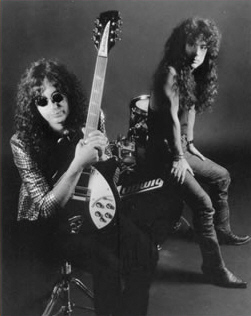
Lizzie Grey & Tim Yasui |
FIBM: What year did you form Sister and how did the band come together?
Lizzie: I didn't form Sister. Blackie had done that band years before I hooked up with him. I only convinced him that we should revive it. I've always been a huge early Alice Cooper fan, and the character that Blackie created for Sister, eating night crawlers and pushing the shock rock envelope, was very appealing to me. I was certain
that there was a large audience out there for it and wanted to be a part of it.
|
|
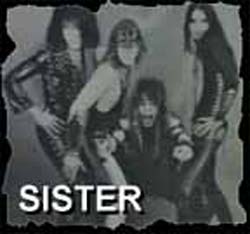
|
FIBM: How did you meet Blackie Lawless?
Lizzie:
When I was in my late teens hanging out in Hollywood at the Starwood and the Rainbow, I used to see him around. You couldn't
miss him in his Elvira get-up while the rest of the city was sparkling glitter and glammed out to the max. The chicks all
used to make fun of him, but I still thought he was cool, and eventually
chatted him up a few times about rock and roll. It was around 1977 that we started working on Sister together.
FIBM: How did you meet Nikki Sixx?
Lizzie: Blackie ran an ad in the Recycler for a bass player as we struggled
to put Sister together, and low and behold, Frank Ferrana, newly imported from Seattle, showed up at Blackie's place with girlfriend
Angie Saxon in tow. She wouldn't shut up and he was pretty quiet throughout the whole ordeal. She kept telling us what Frank was
and wasn't willing to do in a band and basically treating us like we were auditioning for her! Blackie didn't like him or her on
sight, but I thought he looked like John Waite from the
Babys and had star potential. I convinced Blackie that we should give him a go. Soon thereafter, Frank and I were good friends.
|
FIBM: It's quite humorous, that Blackie began kicking out members
from his band way before he
kicked everyone out of WASP. Why did he kick Nikki Sixx out of the band?
Lizzie: Sister went to record a demo down in the South Bay at some funky 8-track studio, and Blackie
wasn't happy with the results. He was kind of a control freak when it came to recording, and he felt that Frank couldn't cut it. Soon
after he fired Frank, I decided that the real problem was Blackie, not Frank, so I dropped by his house on Mansfield, where he was
living with this punk band called the Vidiots, and asked him if he wanted to put together an over-the-top glitter/glam band and leave
Blackie in his dungeon. It was a little bit after that we decided on the name London for the band and Frank changed his name to Nikki.
FIBM: What were some of the things that Nikki Sixx adapted from the Sister days, that he used in Motley Crue?
Lizzie: Well, ya know, that's the funny part. Once Nikki started making a big noise with Motley
Crue, he suddenly threw away all the glitter/glam imagery that had made him so popular in Hollywood with the London band, and outfitted
Motley Crue and their stage EXACTLY like the old Sister band photos...right down to the skulls on spikes, pentagrams, and
flame pots. I guess Blackie really messed with Nikki's mind when he fired him, and this was Nikki's way of doing an ego "checkmate" on
him.
|
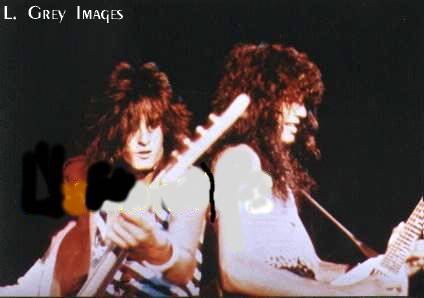 Nikki Sixx & Lizzie Grey
Nikki Sixx & Lizzie Grey |
FIBM: What was the songwriting process like between you, Blackie and Nikki?
Lizzie: Blackie wrote his own songs and was very unreceptive to outside influence. Nikki and
I wrote a few things as genuine collaborations, but in truth, we were an awful lot like Blackie, too. A lot of ego going on there.
FIBM: Who was the drummer for Sister?
Lizzie: I honestly can't remember the name of the original drummer who played on the South Bay recordings. The band never played out live
FIBM: Do you still have the tracks that Sister recorded? Where did you record the demo and will the songs ever see the light of day?
Lizzie: I'm sure they're floating around somewhere in e-bay land, but I haven't seen them. In all honesty, I don't even remember which songs we recorded.
FIBM: How often did Sister play out and what was a typical Sister show like? Was the place always packed?
Lizzie: Sister never played out while I was in it. I don't think it did after I left either. Blackie
changed the name to Circus Circus and they made a bit of a noise in town.
|
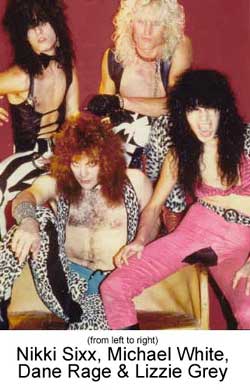
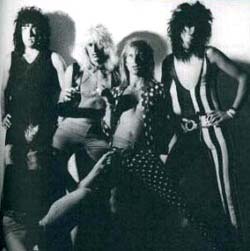
|
FIBM: 3 fond memories from your days in Sister.
Lizzie: 1. Drinking vodka and coke in Blackie's car every night.
2. Going to the Rainbow every night.
3. Bringing chicks from the Rainbow back to Blackie's place every night...and on one occasion breaking his riding crop over some chick's fine naked ass.
FIBM: After Sister you formed the first version of London with Nikki. What made you leave Blackie to form a new band?
Lizzie:
Creative differences. My 70's glitter influences got the best of me, and I came to the realization that I wanted to write and perform
upbeat pop melodies in the vein of Sweet and Mott the Hoople more than I wanted to be a part of pseudo-Alice Cooper dirge performance.
FIBM: What year did London form and how long was the band together? (the original version)
Lizzie: Nikki and I started London in early 1978. The band was the center of the universe
in Hollywood for a little over a year, before it crashed and burned in late 1979
with the loss of vocalist Nigel Benjamin, who had joined London after the demise of the post-Ian Hunter Mott the Hoople band.
FIBM: It was in London that the song, "Public Enemy #1" was written. Was the
song written by you and Nikki or just you, at the time, and how much did it change by the time it was released on Too Fast For Love?
Lizzie: I wrote the song, brought it into the band to work it up, and it became the centerpiece
of the London live shows. The version that appears on the Too Fast For Love album is not very different from the original, except
for the "Oh yeah" chorus parts. To be perectly honest, I was a bit upset when I first saw the Leathur Records album giving me
half-credit for my own song. I really didn't think much was going to become of the band or the record, though, so I didn't
do anything about it. When I found out that Elektra was re-releasing Too Fast For Love, I immediately contacted the label
and threatened a copyright infringement suit on the song. Shortly thereafter, I got a call from Nikki, who told me I could
accept things the way they were or he could pull the song off the album. I decided that my ego needed to take a back seat
to monetary considerations. The rest is history.
|
FIBM: Do you have any points on the "Too Fast for Love" release, or is it just based on publishing?
Lizzie: Do you really want to bore your readers with the mechanics of entertainment
law?
FIBM: How much have you made, rough estimate, over the years off that one song?
Lizzie: Enough to make me feel better about getting half-credit for my own song.
FIBM: What were your initial thoughts of early Motley Crue? Was there a defining moment when you thought that Nikki was really going to make it with that band?
Lizzie: When I first saw them in their fledgling stages, I thought they were basically just carrying on the London glitter/glam hustle as a four-piece with a better drummer. When they started being taken seriously as heavy metal heroes, I was more than a little surprised by their mass appeal with that audience. Go figure.
|
FIBM: Please share one good drug story, with you & Nikki.
Lizzie: Throughout the Starwood years, we drank tons of rum and cokes and every
time we performed there, it was a "snow flurry" of white powder backstage. It was the 70's and that was the drug of choice. Perhaps my best memory of an incident involving Nikki was his fairly regular throwing up behind his amplifiers while we were onstage.
FIBM: Did the original version of London ever record anything? If so, will it ever be released?
Lizzie:
While Nigel Benjamin was in the band, we recorded a 16-track demo in Burbank. Three of the songs from
that demo "Nobody Loves You Like I Do," "Straight from the Heart" and "Dream Girl" appear on the Spiders & Snakes
London Daze album released on Deadline/Cleopatra Records.
FIBM: 3 fond memories from your days in the first version of London.
Lizzie:
1. Drinking
2. Partying
3. Having sex
|
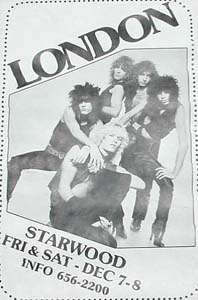
Flyer for Nikki's last show
with London |
| |
| |
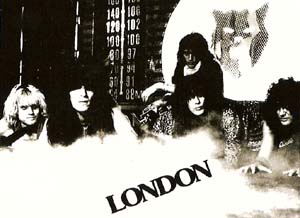
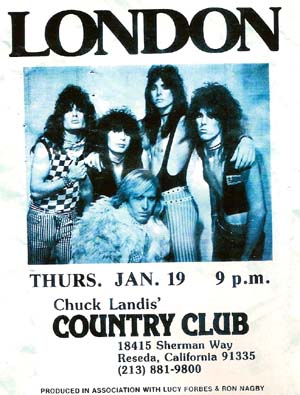
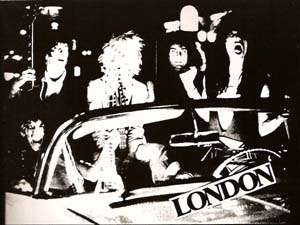
|
FIBM: What was it like working with Nikki Sixx?
Lizzie: 1. Drinking
2. Partying
FIBM: How did Nikki's life begin to change when he was in London, or rather what was the progression of public perception towards him? Did it begin to change while he was in London?and what were the changes?
Lizzie:
In London, Nikki and I were like real-life cartoons, Heckel and Jeckel, having a lot more in common
with the punks than with the heavy metal rock heroes of the time. We played off one another well
and the chemistry onstage was electric, but neither Nikki nor I were perceived by the public as
bass or guitar heroes. Even with the phenomenal success of Motley Crue, I think that the questioning
of his abilities as a bassist in comparison with the "virtuosos" has plagued him. I've never much
given a damn what the elitists thought of my playing. If it works for the fans, then it works, and you're no less a rock hero.
FIBM: Why did Nikki leave the band?
Lizzie: We couldn't find a vocalist to replace the unique voice of Nigel Benjamin. That
was an integral part of the chemistry of London. We had great pop melodies that simply couldn't be carried off by the average vocalist, regardless of how much make-up or hairspray they tried to disguise it with.
FIBM: After Nikki left, Blackie once again joined forces, before the first
version of London folded. Why did he join and why did the band break up soon after?
Lizzie: No mystery there. Blackie was tired of wallowing in obscurity, as
anyone can become after years and years in the rock and roll underground. London had a name and a huge draw and
Blackie wanted to be a part of it. Unfortunately, he simply couldn't pull off the pop melodies. I told him that
his best angle was being an Alice Cooper shock-rock animal, not a pop crooner. Fortunately for him he took my
advice and formed W.A.S.P. Good thing, because he was absolutely horrendous in London.
FIBM: After Nikki and Blackie "made it", did you notice a change in either of them? If so, what were some of the changes?
Lizzie: Yes. They didn't want to be around anyone that
reminded them of the time when they weren't rock stars. That makes Lizzie Grey "Public Enemy #1" to them. Pardon the pun.
FIBM: Describe a typical Day in the Life of Lizzie Grey back while you were in the first version of London.
Lizzie:
1. Drink
2. Play a gig or rehearse
3. Have sex
|
| |
| |
FIBM: After London one of the bands you formed was St. Valentine. Who was in that band and how long before the band broke up?
Lizzie: St. Valentine was Desi Rexx (aka Desi D'Molls), Lizzie Grey, Donnie Cameron, and
Nigel Itson (also of Ruby Slippers). That band lasted a year or two and did some great shows in Hollywood. My favorite one was
opening up for W.A.S.P. at the Troubadour for a Red Cross blood drive. Desi
dressed up like a nurse and was brilliant. Blackie had torn down our balloon drop before our show, but the fans didn't even notice.
FIBM: Later you reformed London. Was Nadir your first choice for vocalist in the new version. How did you meet Nadir?How was it working with Nadir?
Lizzie: The first vocalist in the 2nd reformation of London after the Blackie fiasco was Nigel
Benjamin. I was able to convince Nigel to come back, largely due to the fact that the skyrocketing success of Motley Crue
was keeping the public eye on the London project, as well. We did a few shows in town that were very successful at both
the Troubadour and at the Country Club in the Valley, but when a major record deal failed to materialize, Nigel quickly
lost interest as he had in the previous version, and walked. It was a few years later that the 3rd reformation of
London was begun with bassist Brian West, guitarist Izzie Stradlin, and drummer Steven Adler. The vocalist for that
band was an Englishman named John Ward, who didn't last in the band long enough to do any live shows. When Ward left
the band over creative differences, I asked Izzy to get try to get his former vocalist in Hollywood Rose, Bill Bailey,
to come on board. That never happened, and instead Nadir D'Priest took the helm of the good ship London. It was rough waters ahead.
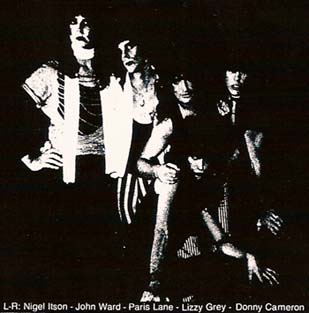 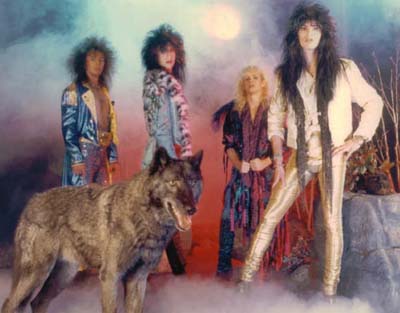
FIBM: Any memories stand out from the Nonstop Rock recording sessions?
Lizzie: I really wasn't 100% behind the metal direction Nadir and Shrapnel Records'
Mike Varney wanted to take the band. I felt like we were playing catch-up ball with Motley Crue, and in fact, we were. My heart
wasn't really in it. Still, we had a lot of fun making the record and it was well-received worldwide.
FIBM: How long was Izzy Stradlin in London and why did he leave?
Lizzie: Izzy didn't last long enough to make it to the Nonstop Rock recording in 1986. Sometime
before that, Nadir beat him up over some groupie, and that was that. He wasn't out of a job for long, though, as shortly thereafter
he got busy putting Guns N' Roses together with Bill Bailey (now Axl Rose), Sol (also in
London for a very brief time with Izzy), Duff, and Steven Adler (who Brian West had fired from London a little before the Izzy incident).
FIBM: How long was Slash in London and how was it working with him? Was he the Slash that the world came to know, back then?
Lizzie: As stated previously, Slash (I knew him as "Sol") was only in
London for a few months. He was a nice person with a genuine love for rock and roll. I jammed with him a
few times at his house off of Fairfax, and I thought his playing style was a lot like Joe Perry of Aerosmith. Unfortunately, he
was having a lot of equipment problems while trying to work with London, and Nadir ended up letting him go. As far as what the
world knows of Slash as a crazed rocker, I'm pretty sure it's more PR than anything.
FIBM: Did you ever consider Axl Rose as a vocalist for London?
Lizzie: Yes. As I said previously, I wanted him to replace John Ward,
but Izzy said that he was very difficult to work with. Some irony there!
FIBM: Any memories stand out from the Don't Cry Wolf recording sessions?
Lizzie: Producer Kim Fowley, the Legend of Hollywood, was great fun
to record with. He's such a character. I loved to piss him off during sessions and call him "Dad." I also
recall that Nadir beat up our manager during one of the sessions over some trivial matter. That was par for the course.
FIBM: In one of our other interviews, Nadir claims he owns the rights to Don't Cry Wolf?
Wouldn't it be beneficial for you to work with him on getting that re-released?.considering bootleg copies sell for over $100.00 on Ebay?
Lizzie: I have no interest in working with Nadir in a musical capacity. He's actually
a nice person when you get to know him, but the violence and turbulence endured during his time in London was more than enough for me.
FIBM: By the time London finally signed to a major label; you were long gone. When did you leave the band and why did you leave after all those years?
Lizzie: See previous response
FIBM: 3 fond memories of your days in the second version of London.
Lizzie: I believe you're referring to the 3rd version of London (with Nadir).
Here's my response to that:
1. Touring
2. Recording
3. Hanging out and partying with Althea Flynt at the Flynt Mansion.
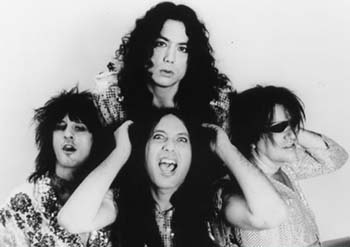 Spiders & Snakes
FIBM: You later formed Spiders and Snakes, which is still going today. How have you been able to maintain the band for a such a long time?
Lizzie: I stopped focusing on being a rock superstar and got into
writing and recording as an expression of myself and my experiences. In other words I stopped being a
hustler and somehow became a legend. Go figure.
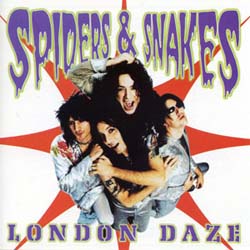 FIBM: One of the Spiders & Snakes releases was entitled, London Daze. Are all the songs on that release from your days in London and are they re-recorded versions?
FIBM: One of the Spiders & Snakes releases was entitled, London Daze. Are all the songs on that release from your days in London and are they re-recorded versions?
Lizzie: As I said previously, London Daze contains three of the original
London (Nigel/Nikki) demos recorded in Burbank. The rest of the album contains a mixture of songs that I wrote in
the various incarnations of London along with some great classic covers including JoJo Gunne's "Run, Run, Run" and
Mott the Hoople's "Rock and Roll Queen." I'm very proud of London Daze, because I think it's simply an honest
rock and roll record that tells my story and is genuinely fun to listen to.
FIBM: Is the version of Public Enemy #1 the version that you originally wrote?
Lizzie: Absolutely
FIBM: 3 fond memories of your days in Spiders & Snakes.
Lizzie: 1. Amazing fan response that just keeps getting better with every record
release
2. Creative freedom and genuine inspiration that makes recording
an awesome experience
3. Meeting my wife Jennifer on the road and watching my daughter Ariel
being born last year
FIBM: Out of every cd you have ever released, do you have a favorite and if so, what makes it your favorite?
Lizzie: All of the Spiders & Snakes CDs. They're genuine
FIBM: Do you still stay in touch with Blackie or Nikki? If so, when was the last time you talked to one of them?
Lizzie: I saw Blackie several years back when Spiders & Snakes opened up for W.A.S.P. in Minneapolis. It was a great show and a wild crowd. We talked briefly, and he said something very strange to me. He said, "Lizzie, is this really what you want to do with your life?" My answer was, "Yeah, that's why I'm here."
FIBM: Are you surprised by the success of the new Motley tour and why won't a brother hook you up and take you on the road? Did you ever ask him that?
Lizzie: I'm not surprised that nostalgia is a very strong factor in music right now. There's not much good new music out there. As for Nikki, I e-mail him time and again. He was moved by my appearance on his VH-1 Driven episode and contacted me last year after it aired. I was just telling it like it is, and I got a bit emotional when the memory of our last days together as bandmates came flooding back. The last time I corresponded with him was just before the latest Crue tour you're talking about. He doesn't seem to have any interest in giving Lizzie Grey a "leg-up" as it were and throwing Spiders & Snakes on the bill. That's okay. It's like this line from "Dream Girl" that goes, "Everybody makes it, you've only gotta try. You don't need no stranger to tell you why." Indeed.
FIBM: Lizzie Grey is transported in time, back to the year 1978. Is there anything you would do differently?
Lizzie: Use a condom |
THE FAST 5
FIBM: What is your most disgusting habit?
Lizzie: None. I'm perfect.
FIBM: What is the most feminine thing you do?
Lizzie: Dress up in women's clothes
FIBM: If there is a God, what is the first question you would ask God when you arrive?
Lizzie: What's going on with all the tsunamis, hurricanes, floods,
fires, earthquakes, and now bird flu? That stuff sucks!
FIBM: Greatest Rock band of all time?
Lizzie: The Beatles.
FIBM: What were you doing 40 minutes before you sat down to do this interview?
Lizzie: Changing my daughter's diaper
|

